- Home
- L. Ron Hubbard
The Scifi & Fantasy Collection
The Scifi & Fantasy Collection Read online
SELECTED FICTION WORKS
BY L. RON HUBBARD
FANTASY
The Case of the Friendly Corpse
Death’s Deputy
Fear
The Ghoul
The Indigestible Triton
Slaves of Sleep & The Masters of Sleep
Typewriter in the Sky
The Ultimate Adventure
SCIENCE FICTION
Battlefield Earth
The Conquest of Space
The End Is Not Yet
Final Blackout
The Kilkenny Cats
The Kingslayer
The Mission Earth Dekalogy*
Ole Doc Methuselah
To the Stars
ADVENTURE
The Hell Job series
WESTERN
Buckskin Brigades
Empty Saddles
Guns of Mark Jardine
Hot Lead Payoff
A full list of L. Ron Hubbard’s
novellas and short stories is provided at the back.
*Dekalogy—a group of ten volumes
Table of Contents
FOREWORD
BEYOND ALL WEAPONS
THE CROSSROADS
DANGER IN THE DARK
THE GREAT SECRET
GREED
IF I WERE YOU
A MATTER OF MATTER
THE PROFESSOR WAS A THEIF
THE TRAMP
WHEN SADOWS FALL
L. RON HUBBARD
IN THE GOLDEN AGE
OF PULP FICTION
THE STORIES FROM THE
GOLDEN AGE
FOREWORD
Stories from Pulp Fiction’s Golden Age
AND it was a golden age.
The 1930s and 1940s were a vibrant, seminal time for a gigantic audience of eager readers, probably the largest per capita audience of readers in American history. The magazine racks were chock-full of publications with ragged trims, garish cover art, cheap brown pulp paper, low cover prices—and the most excitement you could hold in your hands.
“Pulp” magazines, named for their rough-cut, pulpwood paper, were a vehicle for more amazing tales than Scheherazade could have told in a million and one nights. Set apart from higher-class “slick” magazines, printed on fancy glossy paper with quality artwork and superior production values, the pulps were for the “rest of us,” adventure story after adventure story for people who liked to read. Pulp fiction authors were no-holds-barred entertainers—real storytellers. They were more interested in a thrilling plot twist, a horrific villain or a white-knuckle adventure than they were in lavish prose or convoluted metaphors.
The sheer volume of tales released during this wondrous golden age remains unmatched in any other period of literary history—hundreds of thousands of published stories in over nine hundred different magazines. Some titles lasted only an issue or two; many magazines succumbed to paper shortages during World War II, while others endured for decades yet. Pulp fiction remains as a treasure trove of stories you can read, stories you can love, stories you can remember. The stories were driven by plot and character, with grand heroes, terrible villains, beautiful damsels (often in distress), diabolical plots, amazing places, breathless romances. The readers wanted to be taken beyond the mundane, to live adventures far removed from their ordinary lives—and the pulps rarely failed to deliver.
In that regard, pulp fiction stands in the tradition of all memorable literature. For as history has shown, good stories are much more than fancy prose. William Shakespeare, Charles Dickens, Jules Verne, Alexandre Dumas—many of the greatest literary figures wrote their fiction for the readers, not simply literary colleagues and academic admirers. And writers for pulp magazines were no exception. These publications reached an audience that dwarfed the circulations of today’s short story magazines. Issues of the pulps were scooped up and read by over thirty million avid readers each month.
Because pulp fiction writers were often paid no more than a cent a word, they had to become prolific or starve. They also had to write aggressively. As Richard Kyle, publisher and editor of Argosy, the first and most long-lived of the pulps, so pointedly explained: “The pulp magazine writers, the best of them, worked for markets that did not write for critics or attempt to satisfy timid advertisers. Not having to answer to anyone other than their readers, they wrote about human beings on the edges of the unknown, in those new lands the future would explore. They wrote for what we would become, not for what we had already been.”
Some of the more lasting names that graced the pulps include H. P. Lovecraft, Edgar Rice Burroughs, Robert E. Howard, Max Brand, Louis L’Amour, Elmore Leonard, Dashiell Hammett, Raymond Chandler, Erle Stanley Gardner, John D. MacDonald, Ray Bradbury, Isaac Asimov, Robert Heinlein—and, of course, L. Ron Hubbard.
In a word, he was among the most prolific and popular writers of the era. He was also the most enduring—hence this series—and certainly among the most legendary. It all began only months after he first tried his hand at fiction, with L. Ron Hubbard tales appearing in Thrilling Adventures, Argosy, Five-Novels Monthly, Detective Fiction Weekly, Top-Notch, Texas Ranger, War Birds, Western Stories, even Romantic Range. He could write on any subject, in any genre, from jungle explorers to deep-sea divers, from G-men and gangsters, cowboys and flying aces to mountain climbers, hard-boiled detectives and spies. But he really began to shine when he turned his talent to science fiction and fantasy of which he authored nearly fifty novels or novelettes to forever change the shape of those genres.
Following in the tradition of such famed authors as Herman Melville, Mark Twain, Jack London and Ernest Hemingway, Ron Hubbard actually lived adventures that his own characters would have admired—as an ethnologist among primitive tribes, as prospector and engineer in hostile climes, as a captain of vessels on four oceans. He even wrote a series of articles for Argosy, called “Hell Job,” in which he lived and told of the most dangerous professions a man could put his hand to.
Finally, and just for good measure, he was also an accomplished photographer, artist, filmmaker, musician and educator. But he was first and foremost a writer, and that’s the L. Ron Hubbard we come to know through the pages of this volume.
This library of Stories from the Golden Age presents the best of L. Ron Hubbard’s fiction from the heyday of storytelling, the Golden Age of the pulp magazines. In these eighty volumes, readers are treated to a full banquet of 153 stories, a kaleidoscope of tales representing every imaginable genre: science fiction, fantasy, western, mystery, thriller, horror, even romance—action of all kinds and in all places.
Because the pulps themselves were printed on such inexpensive paper with high acid content, issues were not meant to endure. As the years go by, the original issues of every pulp from Argosy through Zeppelin Stories continue crumbling into brittle, brown dust. This library preserves the L. Ron Hubbard tales from that era, presented with a distinctive look that brings back the nostalgic flavor of those times.
L. Ron Hubbard’s Stories from the Golden Age has something for every taste, every reader. These tales will return you to a time when fiction was good clean entertainment and the most fun a kid could have on a rainy afternoon or the best thing an adult could enjoy after a long day at work.
Pick up a volume, and remember w
hat reading is supposed to be all about. Remember curling up with a great story.
—Kevin J. Anderson
KEVIN J. ANDERSON is the author of more than ninety critically acclaimed works of speculative fiction, including The Saga of Seven Suns, the continuation of the Dune Chronicles with Brian Herbert, and his New York Times bestselling novelization of L. Ron Hubbard’s Ai! Pedrito!
Published by
Galaxy Press, LLC
7051 Hollywood Boulevard, Suite 200
Hollywood, CA 90028
© 2012 L. Ron Hubbard Library. All Rights Reserved.
Any unauthorized copying, translation, duplication, importation or distribution, in whole or in part, by any means, including electronic copying, storage or transmission, is a violation of applicable laws.
Mission Earth is a trademark owned by L. Ron Hubbard Library and is used with permission. Battlefield Earth is a trademark owned by Author Services, Inc. and is used with permission.
Horsemen illustration from Western Story Magazine is © and ™ Condé Nast Publications and is used with their permission. Story illustrations; Fantasy, Far-Flung Adventure and Science Fiction illustrations and Story Preview and Glossary illustrations: Unknown and Astounding Science Fiction copyright © by Street & Smith Publications, Inc. Reprinted with permission of Penny Publications, LLC. When Shadows Fall cover art: © 1948 Better Publications, Inc. Reprinted with permission of Hachette Filipacchi Media.
ISBN 978-1-59212-487-9 ePub version
ISBN 978-1-59212-256-1 print version
ISBN 978-1-59212-246-2 audiobook version
Library of Congress Control Number: 2007928016
Contents
BEYOND ALL WEAPONS
STRAIN
THE INVADERS
GLOSSARY
Beyond All Weapons
Beyond All Weapons
THE revolt was over and the firing parties had begun. In a single day in Under Washington, three thousand rebels were executed and twelve thousand more condemned to life imprisonment in the camps. And the Bellerophon hung fifteen thousand miles out of reach, caught between death by starvation and swifter death by surrender.
She was the last of the rebel ships, the Bellerophon. Sent by Admiral Correlli during the last hours of the action to the relief of an isolated community on Mars, she had escaped the debacle which had overtaken all her sister ships in contest with Earth.
The revolt was ill begun and worse ended. But the cause had been bright and the emergency large, and Mars, long-suffering colony of an arbitrary and aged Earth, had at last, as the dying bulldog seeks to take one final grip on the throat of his foe, revolted against Mother Earth.
But there was little sense in recounting those woes now, as Captain Guide well knew. The taxes and embargoes had all but murdered Mars before the revolt had begun. The savage bombardment of the combined navies of Earth had left an expanse of wasted tillage and shattered towns and the colonists had been all but annihilated.
Like her sisters, the Bellerophon was a converted merchantman. Any resemblance she bore to a naval spaceship was resident only in the minds of her officers and crew. Plying her trade from Cap City to Denverchicago, she had suffered much from being colonial-built. The inspectors on Earth had inspected her twice as often as regulations demanded and found ten times as much fault. And because she was colonial, her duties, enforced by irksome searches and even crew seizures for the Earth Navy, had all but bankrupted Smiley Smith and the line’s directors—not that that mattered now, for the company and all its people were dead in the wreck which had been the finest city in the colonies.
“I won’t surrender!” said Georges Micard, first mate. “Not while I’ve got a gun to fire! It’s their holiday. Let’s give them a few blazing cities to celebrate by!”
Guide, cool, austere, had looked at his mate in silence for a while. He said, “Your plan is not without merit, Georges. We have suffered beyond endurance and our comrades have died gallantly. And a few blazing cities would be much in order were it not for one thing: the barrier.”
Georges, optimistic, very young, was apt to forget practical details. The reason Earth had won had been the barrier. So well had the secret been kept that when the colonial fleet had attacked, every missile they had launched at the queen cities of their mother planet had exploded a thousand miles out from target. There was an invisible barrier there, a screen, an electronic ceiling. And Mars, new-formed, braver than she was sensible, had found herself unable to retaliate for the thunder of missiles which had wrenched her cities from their foundations and laid them into dust.
“All right,” said Georges, glancing around the wardroom at the other officers. “We’ll sit up here until the cruisers come get us and then we’ll vanish in a puff of atoms.”
“They won’t come,” said Carteret. “They know we are here, but they’ll wait for us to starve. They have every spaceport on Mars and Venus. We’re done.”
Gloom deepened in the room. Then Albert Firth, their political adviser, an intense-eyed Scot, honed keen in the chill clime of New Iceland, Mars, leaned forward.
“You interested me, Captain, when you spoke today of the drives for which our fleet should have waited. Exactly what were those drives, sir?”
Guide looked at him with understanding. It was time to speak. These people had depleted their own stores of ideas. Hundreds of thousands of colonists were dead, and as fast as the orders for execution could be issued, thousands more were dying. These men would not cavil at thin chances.
“I have had, for some time, a plan,” he said.
Eyes whipped to him. They knew Guide. Bilged out of the Space Academy at fourteen for one too many duels, raised by the lawless camps of the southern cap on Mars, cast off by his family, but infinitely esteemed by his comrades and former employers, Firstin Guide was a man to whom one paid attention.
“I think they ought to be whipped,” he said quietly.
In more optimistic times, that had been a common opinion on Mars. Since the triarchy of the Polar State had destroyed all free government, the thoughts of less disciplined peoples had run in that vein. Martian colonists were, more lately, refugees from the insensate cruelties and caprices of the Polar regime. And they had all thought that the “snow devils”—that strange race who had managed to adapt their metabolism to the blood-chilling climate of the North Pole, and who in half a century had made their unexploited realm the prime power of Earth—ought to be whipped. But here, in a ship almost out of food, low on ammunition, with half her fuel gone and her cause already lost, those words drew a quick intake of breath from all. But they knew Firstin Guide. He would not speak idly.
“At Spencerport,” he began, “a technician named Jones perfected, about five years ago, an extra-velocity fuel. You all know of that. It burns too fast and has too much thrust for anything but spurt space racing.”
“I know the fuel,” said Albert. “But Spencerport was wiped out.”
“So it was. But it happens that I was loaded with EV fuel for transport to Earth when I was mobilized. I landed that cargo when I landed my merchant crew and took aboard you gentlemen of the Naval Volunteers. That fuel is cached at Rangerhaven. I was not raised to trust the expected to happen, gentlemen. I put it in a vault.”
“But what has this to do with us?” said Georges. “Sure, we can risk a landing at Rangerhaven, that’s ninety leagues south of nowhere, the most godforsaken spot on Mars. But of what value could this fuel be—?”
“Gentlemen, there have been several attempts for the stars.”
They stared at Guide, unwinking, at once stunned and elated. And then Firth relaxed. “No use, sir. Ships have gone. But ships don’t come back. That’s been a closed book, Captain.”
“If you have closed a book recently, Mr. Firth, you doubtless noticed that it could be opened again.”
They
were restless then. They wanted to believe they had a chance. They could imagine they heard the firing parties at Under Washington. And they had been on half rations for a week.
Guide looked coolly at them. He had judged his moment rightly. “I picked up a technician from the prisoners we took at Americaville. A very well-educated young Eskimo.”
They recalled this, and they also recalled Guide’s insistence that they sort out the garrison before they executed the Earth infantry.
“He is down in the brig,” said Guide. And he sat back to give them his final stroke, casually, almost bored. “He knows the formulae of the barricade.”
When he saw how deeply this shaft had sunk, he followed it. “And with those formulae a single vessel could penetrate it and, with her drives alone, lay waste the central Polar cities. That done, the restoration of free government on Earth would be very simple. All that is necessary is that we take all we can in the way of technology and personnel, lay a course for the stars—Alpha Centauri first—and locate a habitable planet. That they exist is unquestionable. There we set up a colony, build our barrier-breaker and return to Earth as a combat ship to ruin Polar domination.”
He lighted a small cigar to make it all seem simple. “I think,” he said, “that they should be whipped.”
His attitude, his casualness, drove away the terrible question marks posed by the plan. Ships had gone, using EV fuel. Ships had not come back. Theoretically it was impossible to travel to the stars, but theory is a cold thing and subject to much reversal. Theoretically a ship blew up when it tried to break the “wall of light.” But there had been many another theory which, in practice, had proven wrong.
They were none of them mathematicians. They were what they called practical men. All but Firth had grown up in space travel around the Sun. The heartbeat of Mars was Earth commerce and it had been to preserve that commerce that they had fought. Therefore a stellar voyage was only an extension of what they already knew.
“I have no instruments for measuring speed nor even for navigation to the stars,” said Guide. “I have no idea whether we can ‘break the wall.’ I know no more than you what lies out there en route to Alpha Centauri. But I know what lies before us here—a firing party for ourselves and the end of freedom in this system forever. I think,” he added, after a slow puff at his cigar, “that an unknown and even dangerous adventure is preferable to a sordid certainty. Your votes?”

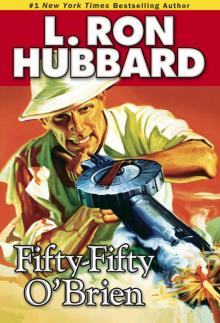 Fifty-Fifty O'Brien
Fifty-Fifty O'Brien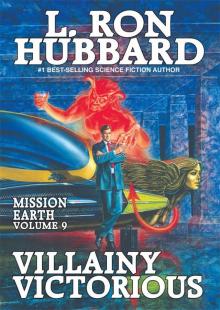 Villainy Victorious
Villainy Victorious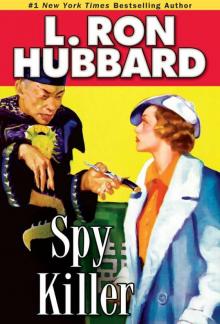 Spy Killer
Spy Killer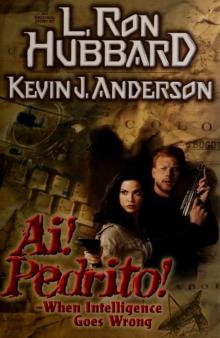 Ai! Pedrito!: When Intelligence Goes Wrong
Ai! Pedrito!: When Intelligence Goes Wrong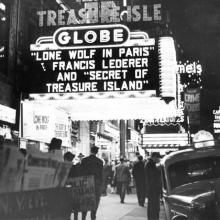 The Dangerous Dimension
The Dangerous Dimension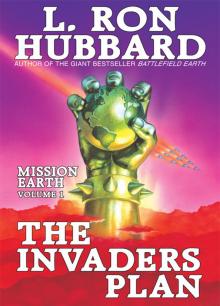 Mission Earth Volume 1: The Invaders Plan
Mission Earth Volume 1: The Invaders Plan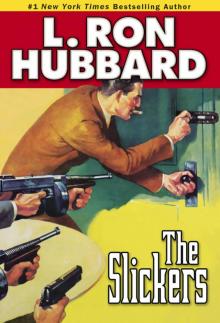 The Slickers
The Slickers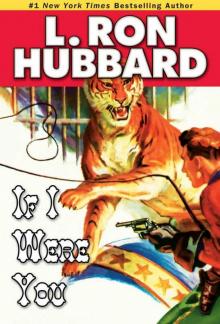 If I Were You
If I Were You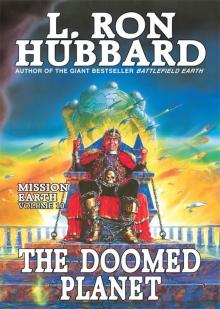 The Doomed Planet
The Doomed Planet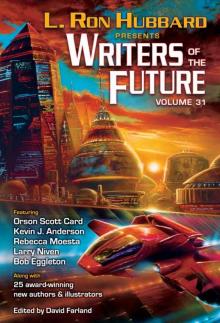 Writers of the Future Volume 31
Writers of the Future Volume 31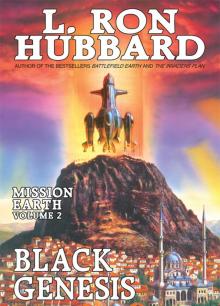 Mission Earth Volume 2: Black Genesis
Mission Earth Volume 2: Black Genesis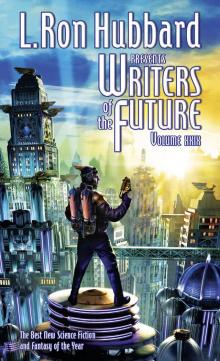 Writers of the Future: 29
Writers of the Future: 29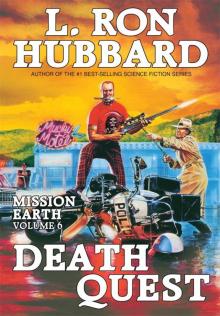 Death Quest
Death Quest The Enemy Within
The Enemy Within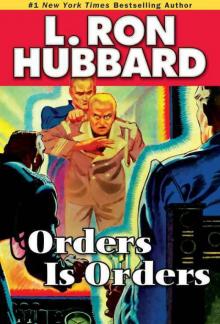 Orders Is Orders
Orders Is Orders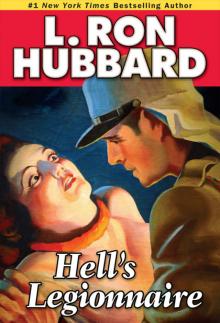 Hell's Legionnaire
Hell's Legionnaire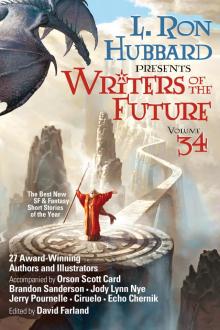 L. Ron Hubbard Presents Writers of the Future 34
L. Ron Hubbard Presents Writers of the Future 34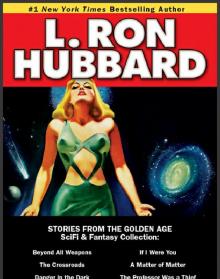 The Scifi & Fantasy Collection
The Scifi & Fantasy Collection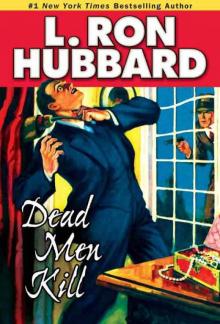 Dead Men Kill
Dead Men Kill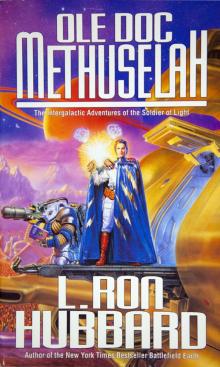 Ole Doc Methuselah: The Intergalactic Adventures of the Soldier of Light
Ole Doc Methuselah: The Intergalactic Adventures of the Soldier of Light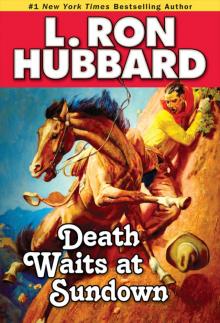 Shadows From Boot Hill
Shadows From Boot Hill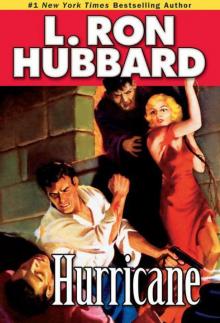 Hurricane
Hurricane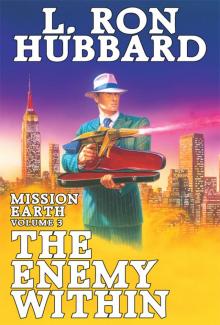 Mission Earth Volume 3: The Enemy Within
Mission Earth Volume 3: The Enemy Within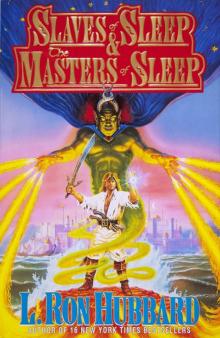 Slaves of Sleep & the Masters of Sleep
Slaves of Sleep & the Masters of Sleep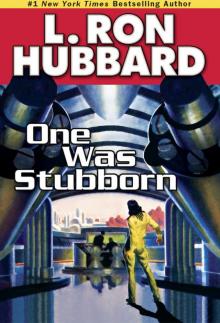 One Was Stubborn
One Was Stubborn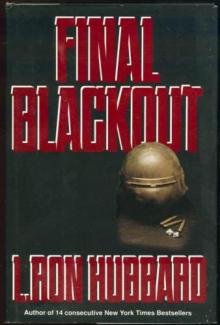 Final Blackout: A Futuristic War Novel
Final Blackout: A Futuristic War Novel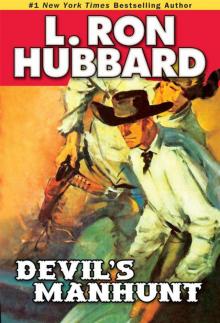 Devil's Manhunt
Devil's Manhunt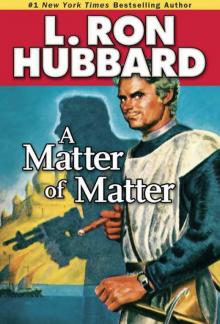 A Matter of Matter
A Matter of Matter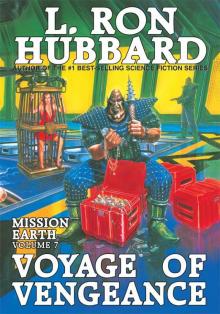 Voyage of Vengeance
Voyage of Vengeance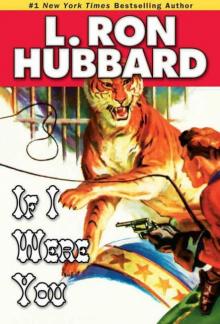 If I Were You (Science Fiction & Fantasy Short Stories Collection)
If I Were You (Science Fiction & Fantasy Short Stories Collection)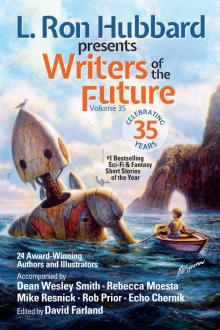 L. Ron Hubbard Presents Writers of the Future Volume 35
L. Ron Hubbard Presents Writers of the Future Volume 35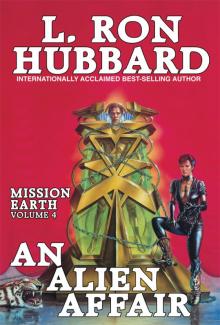 Mission Earth Volume 4: An Alien Affair
Mission Earth Volume 4: An Alien Affair Black Genesis
Black Genesis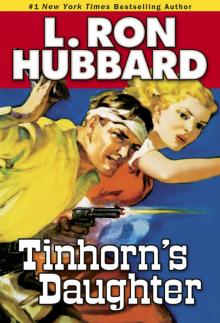 Tinhorn's Daughter
Tinhorn's Daughter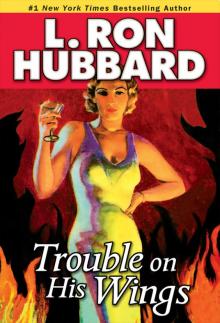 Trouble on His Wings
Trouble on His Wings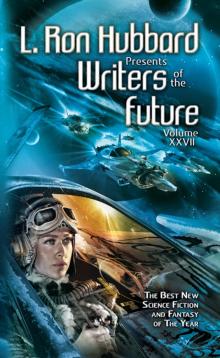 Writers of the Future Volume 27: The Best New Science Fiction and Fantasy of the Year
Writers of the Future Volume 27: The Best New Science Fiction and Fantasy of the Year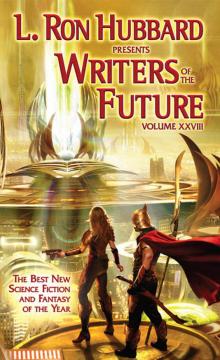 Writers of the Future Volume 28: The Best New Science Fiction and Fantasy of the Year
Writers of the Future Volume 28: The Best New Science Fiction and Fantasy of the Year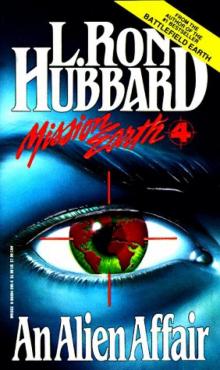 An Alien Affair
An Alien Affair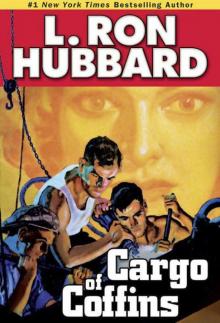 Cargo of Coffins
Cargo of Coffins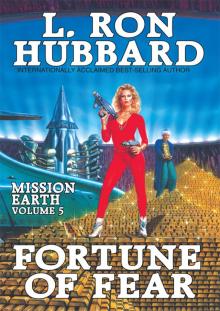 Mission Earth Volume 5: Fortune of Fear
Mission Earth Volume 5: Fortune of Fear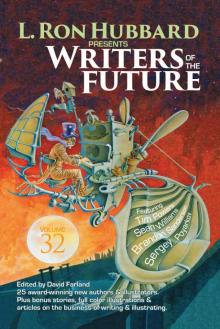 Writers of the Future 32 Science Fiction & Fantasy Anthology
Writers of the Future 32 Science Fiction & Fantasy Anthology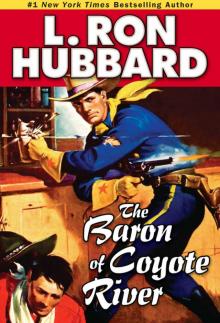 The Baron of Coyote River
The Baron of Coyote River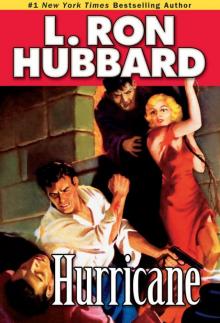 Hurricane (Stories From the Golden Age)
Hurricane (Stories From the Golden Age) Dianetics: The Modern Science of Mental Health
Dianetics: The Modern Science of Mental Health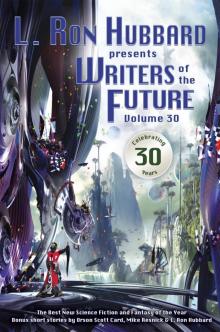 Writers of the Future, Volume 30
Writers of the Future, Volume 30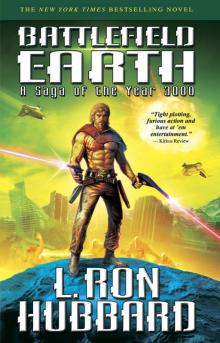 Battlefield Earth: A Saga of the Year 3000
Battlefield Earth: A Saga of the Year 3000 Fear
Fear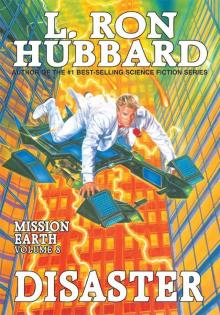 Disaster
Disaster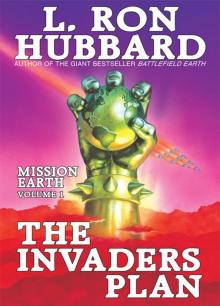 Invaders Plan, The: Mission Earth Volume 1
Invaders Plan, The: Mission Earth Volume 1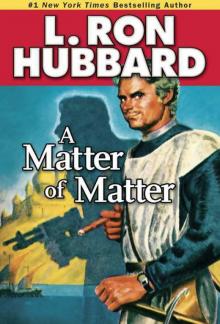 A Matter of Matter (Stories from the Golden Age)
A Matter of Matter (Stories from the Golden Age)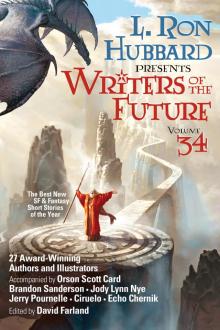 Writers of the Future Volume 34
Writers of the Future Volume 34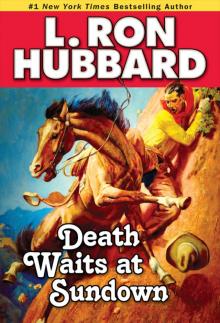 Death Waits at Sundown
Death Waits at Sundown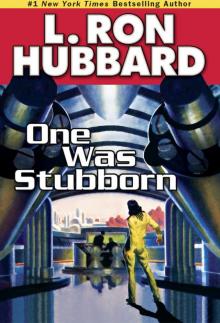 One Was Stubbron
One Was Stubbron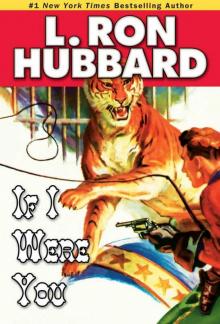 If I Were You (Stories from the Golden Age)
If I Were You (Stories from the Golden Age)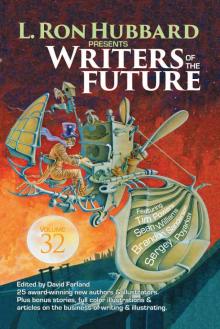 Writers of the Future 32 Science Fiction & Fantasy Anthology (L. Ron Hubbard Presents Writers of the Future)
Writers of the Future 32 Science Fiction & Fantasy Anthology (L. Ron Hubbard Presents Writers of the Future)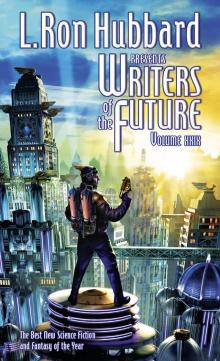 Writers of the Future, Volume 29
Writers of the Future, Volume 29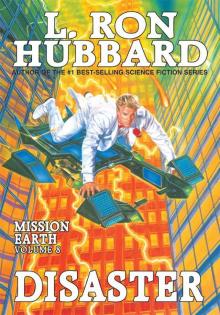 Mission Earth Volume 8: Disaster
Mission Earth Volume 8: Disaster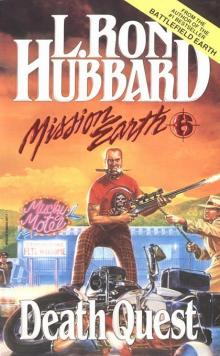 Mission Earth 6: Death Quest
Mission Earth 6: Death Quest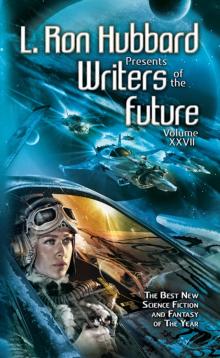 Writers of the Future, Volume 27
Writers of the Future, Volume 27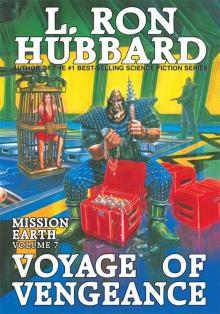 Mission Earth Volume 7: Voyage of Vengeance
Mission Earth Volume 7: Voyage of Vengeance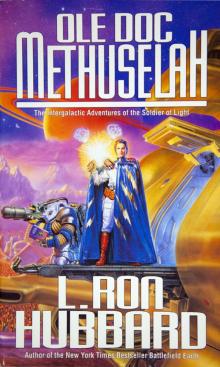 Ole Doc Methuselah
Ole Doc Methuselah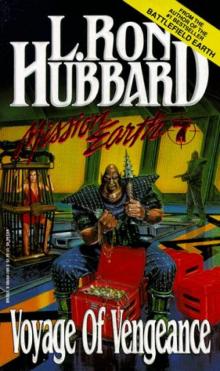 Mission Earth 07: Voyage of Vengeance
Mission Earth 07: Voyage of Vengeance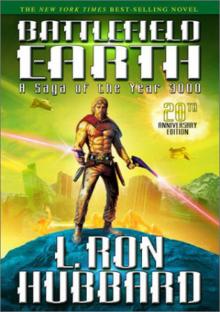 Battlefield Earth
Battlefield Earth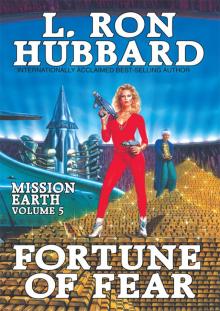 Fortune of Fear
Fortune of Fear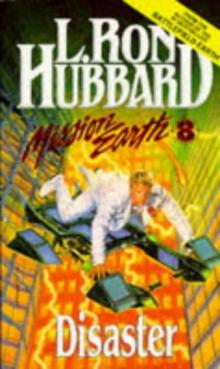 Mission Earth 8: Disaster
Mission Earth 8: Disaster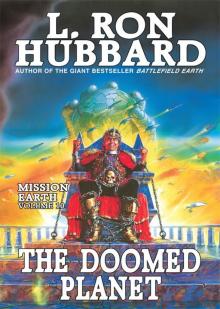 Mission Earth Volume 10: The Doomed Planet
Mission Earth Volume 10: The Doomed Planet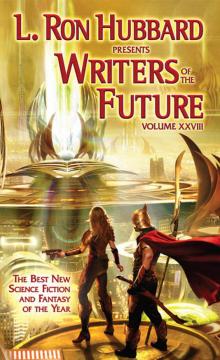 Writers of the Future, Volume 28
Writers of the Future, Volume 28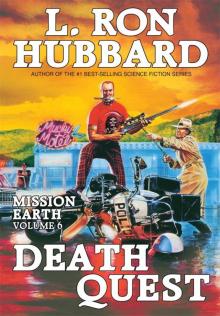 Mission Earth Volume 6: Death Quest
Mission Earth Volume 6: Death Quest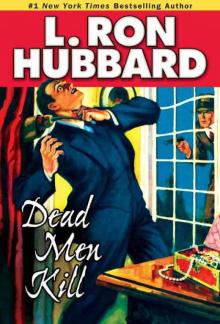 Dead Men Kill (Stories from the Golden Age)
Dead Men Kill (Stories from the Golden Age)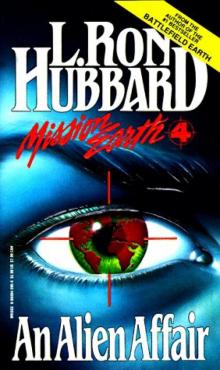 Mission Earth 4: An Alien Affair
Mission Earth 4: An Alien Affair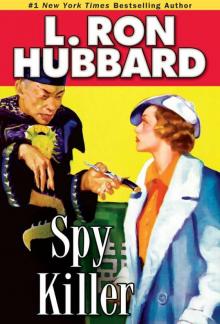 Spy Killer (Stories from the Golden Age)
Spy Killer (Stories from the Golden Age)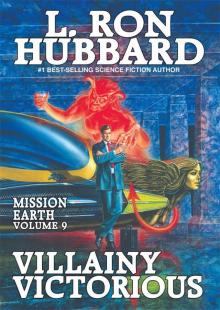 Mission Earth Volume 9: Villainy Victorious
Mission Earth Volume 9: Villainy Victorious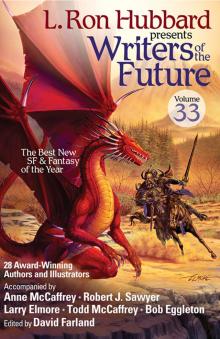 L. Ron Hubbard Presents Writers of the Future, Volume 33
L. Ron Hubbard Presents Writers of the Future, Volume 33